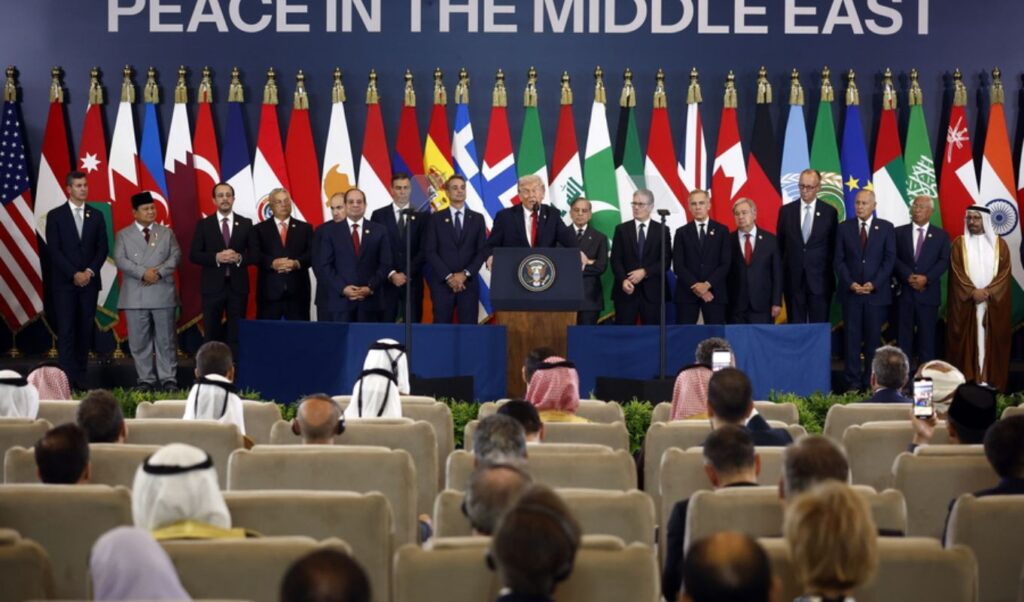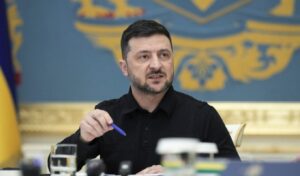The White House has released the text for Gaza that was signed by Donald Trump, Egyptian President Al-Sisi, Emir of Qatar Al-Thani, and Turkish President Recep Tayyip Erdogan at the Sharm El Sheikh Summit. This is a document that captures general principles, titled “The Trump Declaration for Lasting Peace and Prosperity.”
The White House, in its statement, notes that “we pursue a comprehensive vision of peace, security, and shared prosperity in the region, grounded in the principles of mutual respect and mutual destiny. We commit ourselves to a future of enduring peace.”
“We pursue a comprehensive vision of peace, security, and shared prosperity in the region, grounded in the principles of mutual respect and shared destiny…. We commit ourselves to a future of enduring peace.” pic.twitter.com/qj38wYELVM
— The White House (@WhiteHouse) October 13, 2025
Read: Gaza agreement begins second and more difficult phase of ceasefire after triumphant atmosphere in Egypt with signing of Trump plan – “We avoided World War III” (Images)
The Trump Declaration for Lasting Peace and Prosperity – “Gaza agreement”
The following is the full text of the peace agreement for the Gaza Strip that was signed during the Summit convened by Donald Trump in Sharm El Sheikh, Egypt:
“We, the undersigned, welcome the truly historic commitment and implementation by all parties of the Trump Peace Agreement, which put an end to more than two years of deep pain and loss — opening a new chapter for the region, defined by hope, security, and a shared vision for peace and prosperity.
We support and endorse the sincere efforts of President Trump to end the war in Gaza and bring lasting peace to the Middle East. Together, we will implement this agreement in a way that ensures peace, security, stability, and opportunities for all peoples of the region, including both Palestinians and Israelis.
We understand that lasting peace will be one where both Palestinians and Israelis can prosper, with their fundamental human rights protected, their security guaranteed, and their dignity preserved.
We affirm that substantial progress comes through cooperation and ongoing dialogue, and that strengthening bonds between nations and peoples serves the lasting interests of regional and global peace and stability.
We recognize the deep historical and spiritual significance of this region for religious communities whose roots are inextricably linked to the land — among them Christianity, Islam, and Judaism. Respect for these sacred bonds and protection of their cultural and religious monuments will remain of paramount importance in our commitment to peaceful coexistence.
We are united in our determination to eliminate extremism and radicalization in all their forms. No society can prosper when violence and racism are normalized or when radical ideologies threaten the social fabric. We commit to addressing the conditions that allow extremism to spread and to promote education, opportunities, and mutual respect as foundations for lasting peace.
We hereby commit to resolving future differences through diplomatic approach and negotiations, not through violence or prolonged conflicts. We recognize that the Middle East cannot endure a persistent cycle of protracted wars, deadlocked negotiations, or the fragmented, incomplete, or selective implementation of successfully agreed terms. The tragedies of the last two years must serve as an urgent reminder that future generations deserve something better than the failures of the past.
We seek tolerance, dignity, and equal opportunities for every person, ensuring that this region will be a place where all can pursue their ambitions within peace, security, and economic prosperity, regardless of race, religion, or ethnicity.
We pursue a comprehensive vision of peace, security, and shared prosperity in the region, based on the principles of mutual respect and common destiny.
In this spirit, we welcome the progress that has been achieved in establishing comprehensive and lasting peace arrangements in the Gaza Strip, as well as the friendly and mutually beneficial relationship between Israel and its regional neighbors. We commit to working collectively for the implementation and maintenance of this legacy, building institutional foundations upon which future generations can prosper together in peace.
We commit ourselves to a future of enduring peace.”
Donald J. Trump – President of the United States of America
Abdel Fattah El-Sisi – President of the Arab Republic of Egypt
Tamim bin Hamad Al Thani – Emir of the State of Qatar
Recep Tayyip Erdogan – President of the Republic of Turkey
Trump: Gaza reconstruction begins now
“Reconstruction begins now” in Gaza, declared US President Donald Trump, calling yesterday a “wonderful” day for the Middle East, at the Gaza Summit hosted in Egypt where international mediators signed a declaration for ending the war in the Palestinian enclave.
Donald Trump, who presented the ceasefire plan for the Palestinian enclave in late September, co-chaired the summit in Sharm El Sheikh with Egyptian President Abdel Fattah al-Sisi, with many foreign leaders present — but without Israeli Prime Minister Benjamin Netanyahu or Hamas.
Trump notably gathered the leaders around him on a red carpet, smiling and shaking each one’s hand separately. Against a backdrop of a giant “PEACE 2025” sign, he continuously raised his thumb before cameras. Together with the leaders of Egypt, Qatar, and Turkey, he then signed the Gaza Strip declaration text, as a guarantee for the ceasefire agreement. The four countries commit to “pursue a vision of peace” in the Middle East and praise the “progress achieved” in implementing “arrangements” for “lasting peace” in Gaza.
“The document will detail the rules and provisions and many other things,” Trump declared, repeating twice that “it will be upheld.” He made no further clarifications. “Together we accomplished something the whole world thought was impossible. Finally we have peace in the Middle East,” the American president assured before departing Egypt.
Al-Sisi announced that his country will host an international conference for Gaza Strip reconstruction, without clarifying the date.
Yesterday, twenty hostages were handed over in two phases to the International Committee of the Red Cross and Red Crescent, whose vehicles departed toward Israel under the watch of armed Hamas fighters. Most of the 251 people who had been abducted and held in the Gaza Strip were freed in the previous two truces.
In the unprecedented Hamas raid on southern Israel on October 7, 2023, 1,219 people lost their lives on the Israeli side, mostly civilians, according to an AFP tally based on official data. In retaliation, Israel launched large-scale military operations in the Gaza Strip, which caused incalculable destruction, humanitarian catastrophe, and the deaths of at least 67,869 people, mostly civilians, according to Hamas Health Ministry data.
“It is time to allow large-scale humanitarian aid to enter, particularly under UNRWA’s responsibility,” stated yesterday the director-general of the United Nations Relief and Works Agency for Palestine Refugees in the Near East, Philippe Lazzarini.
The first phase of the American plan provided, beyond the ceasefire and withdrawal of Israeli forces from specific sectors of the Gaza Strip, that the last 47 hostages held in Gaza would return within 72 hours, 27 of whom are dead.
However, the Israeli military announced it received only four hostage bodies through the Red Cross yesterday: “Hamas is obligated to uphold the agreement and take necessary measures for the return of all deceased hostages.”
Hamas, on the other hand, praised “the liberation of Palestinian prisoners in occupation jails,” speaking of “national success on the road to complete liberation.”
The Trump plan envisions a later phase during which Hamas will be excluded from power in the Palestinian enclave, where it assumed governance in 2007, and will be disarmed. The Palestinian Islamist movement, however, has by no means consented to its disarmament and continues to demand the complete withdrawal of Israeli armed forces from the Gaza Strip. The Israeli military estimates it currently controls 53% of the enclave. A Hamas official warned the day before yesterday that a “difficult” second phase of negotiations is imminent.
Macron: I continue to worry about Hamas – You don’t dismantle a terrorist organization with thousands of fighters, underground tunnels and this type of weaponry overnight
For his part, French President Emmanuel Macron emphasized yesterday Monday that he sees a continuing threat from the Palestinian Islamist movement Hamas, despite the ratification of the ceasefire agreement in the Gaza Strip, after two years of war.
No terrorist actions and destabilization are expected in the coming weeks and months, estimated the French head of state departing from Sharm El Sheikh, the Egyptian resort on the Red Sea where he was present at the signing ceremony of the agreement proposed by Washington and concluded between Hamas and Israel — with both parties absent.
However, “I continue to worry, because we know how things are with terrorist organizations,” Macron continued, when asked by a journalist if he predicts Hamas will fill the “power vacuum” in the coastal enclave.
“You don’t dismantle a terrorist organization with thousands of fighters, underground tunnels and this type of weaponry overnight,” he continued, calling for international monitoring of the situation, according to video released by the Élysée.
Earlier, American President Donald Trump told journalists accompanying him on the flight to Israel that his administration allowed Hamas fighters to continue operating temporarily in the Gaza Strip, to restore order.
However, in his speech to the Knesset, the Israeli parliament, several hours later, the US President insisted that many governments in the region want Hamas disarmed.
Macron also thanked his Egyptian counterpart Abdel Fattah al-Sisi and American counterpart Trump for inviting Palestinian Authority President Mahmoud Abbas to Sharm El Sheikh.
He characterized the Palestinian Authority’s participation as “the day’s achievement,” as he believes safeguarding the prospect of the two-state solution is essential.
Israeli Prime Minister Benjamin Netanyahu rejects the two-state solution, as does Hamas.




